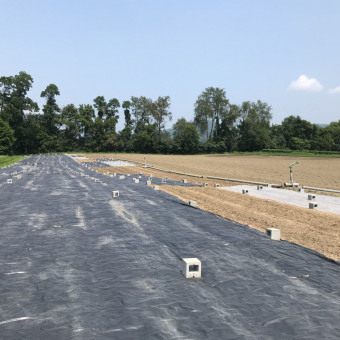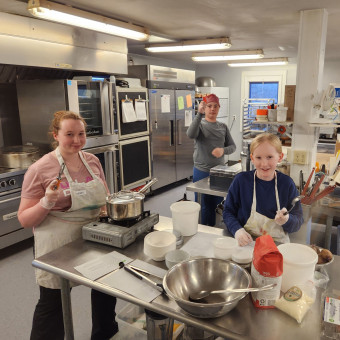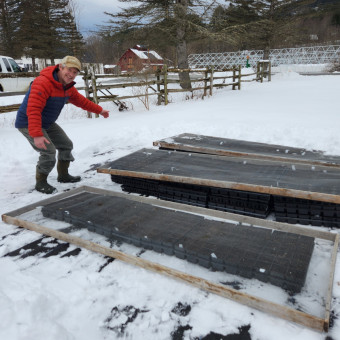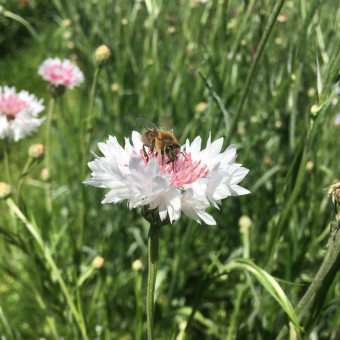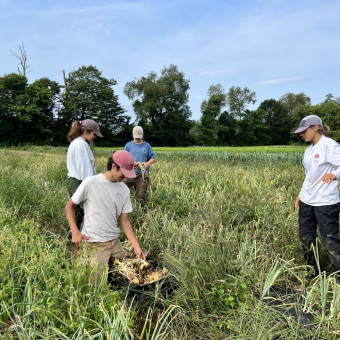Notes From Paris: Part 2
There are thousands of activists here in Paris from all over the world representing various groups that are all rallying for change from many perspectives. Our focus, of course, is agriculture - the enormous problems industrial scale farming has caused and the incredible potential for organic, regenerative agriculture to help solve the problem of climate change. People who have attended our sessions and have been unfamiliar with regenerative agriculture as a solution have commented, “this is the first time we have felt hope during this summit.”
The sessions we have helped organize or attended on this subject have really given us a lot of energy to keep on this path, with the goal of trying to facilitate the spread of regenerative agriculture and forestry. Two nights ago, there was a session at a Paris venue called LE REcyclerie, a cool, community-based place that is all about recycling. They incorporate a tool exchange area in their space where they recycle all their waste and serve good organic food and wine. It was a perfect place for the Regeneration International event called “Cool the Planet, Feed the World: The Power of Regenerative Food and Farming to Save the Planet.” About 150 people gathered together to see Vandana Shiva, Hans Herren from the Millennium Institute, Andre Leu from IFOAM, Will (our own CCF), and Ronnie Cummins from OCA – all giving different perspectives to help folks understand the many facets of global warming and the issues we currently face and will come to face in the future.
Various inspirational documentary films were shown to illustrate the case of carbon draw-down through good farming practices. One film, in particular, shed light on an incredible regenerative forest project in Brazil. A huge area that was completely degraded was brought back to life within a 10 year period by planting new trees and managing them properly - thinning and aggressive pruning all aimed at building up the soil again. That healthy, living soil is sequestering so much carbon, and that specific practice is taking place in many places around the world! The film reinforced what we at Regeneration International know and aim to communicate to the globe: Getting carbon back into the soil IS possible – through re-forestation, good grazing, and proper management of veggies and grains.
Unfortunately, it’s not enough to simply communicate what you know and see it take root. We and all the other activists were in Paris to try to influence the official COP21 negotiations. A couple of our colleagues at RI, namely international negotiators, have been present at these COP meetings for years, and they feel hopeful because agriculture is finally on the agenda. The French 4/1000 initiative – their pledge to provide incentives for farmers to increase organic matter in their soils by 4 parts per 1000 - is paving the way for getting key issues related to carbon draw-down on the table. The fact that so many other countries have signed on brings positive anticipation, as well. However, we all need to keep in mind that these negotiations often end in utter frustration for people who are truly deeply invested in finding solutions to climate change. Since time is running out, we hope there is at last an urgency on the part of the policy makers.
RI marketing consultant Steve Hoffman reported the following on the official negotiations: “In a special half-day session held on December 2 at the COP21 summit, David Nabarro, the United Nations Secretary General’s special representative for food security and nutrition, outlined the ‘huge potential’ for agriculture, based on the initiatives presented, to be a solution for climate change. ‘The time has come to reshape agriculture, but it must be of the right type: regenerative, smallholder centered, focused on food loss and waste, adaptation, soils management, oceans and livestock,’ Nabarro said.” When we remember that agriculture has not before been broached as any kind of solution, Nabarro’s words are a good sign. Yet, in the wake of hope and positivity, people seem to be cautiously optimistic about the negotiations.
In the meantime, what we all as farmers and activists have to remember is that our main goal is to spread the practice of regenerative agriculture throughout the world so that it becomes the dominant form of growing food. This is the type of farming that is practiced by small farmers throughout the world. In short, yes, our work is cut out for us. We have to return back home, continue to do better in our own farming practices, and be advocates for restorative farming methods. To support this need for good food and farming, we also need the support and demand for product from the millions of conscious consumers whose awareness of their role is hopefully growing. As we have discussed many times over the last two weeks, “together we can do this!”


